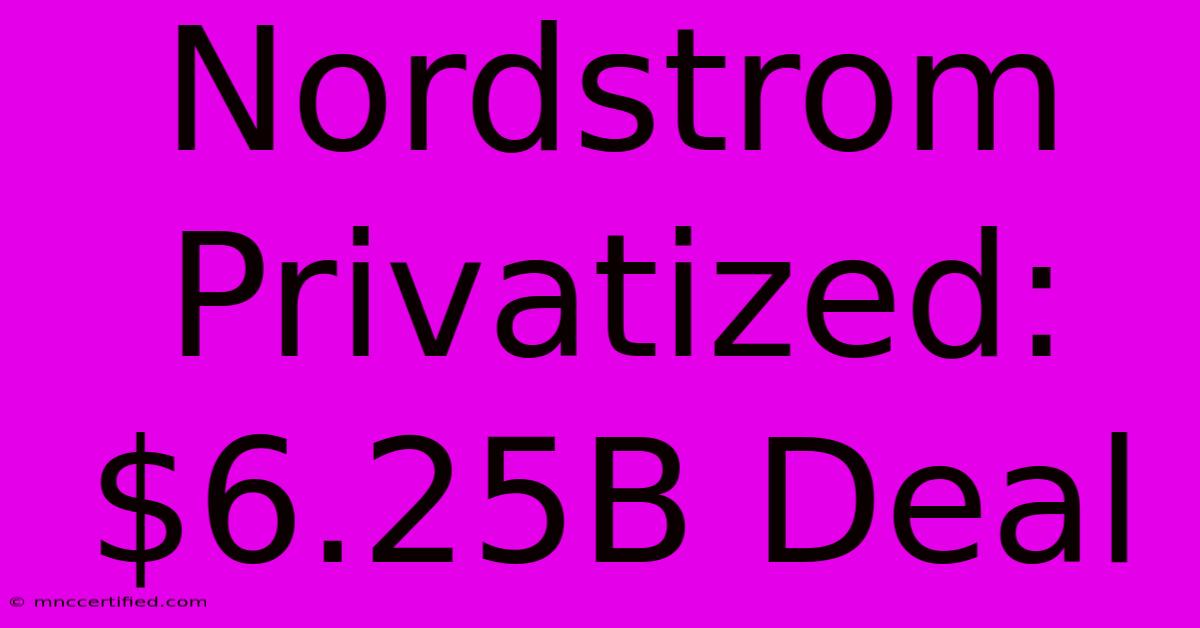Nordstrom Privatized: $6.25B Deal

Table of Contents
Nordstrom Privatized: A $6.25 Billion Deal Shakes Up Retail
The retail landscape shifted significantly in 2023 with the surprising news that Nordstrom, a long-standing department store giant, went private in a deal valued at $6.25 billion. This acquisition, led by the Nordstrom family, marks a major turning point for the company and raises important questions about the future of department stores in the age of e-commerce. This article delves into the details of this significant transaction, exploring its implications for Nordstrom, its employees, and the broader retail industry.
The Key Players and the Deal's Structure
The privatization of Nordstrom was orchestrated by a group led by members of the founding Nordstrom family. This consortium, including the current CEO Erik Nordstrom and his brother Peter, successfully bought out the remaining public shareholders. The deal, finalized at $6.25 billion, valued the company at approximately $8.3 billion including debt. This price reflects a significant premium over the stock's trading price prior to the announcement, indicating investor confidence in the family's long-term vision for the company.
A Strategic Move or a Necessary Retreat?
The decision to take Nordstrom private is a complex one, sparking debate amongst retail analysts. Some see it as a strategic maneuver allowing the family to implement long-term plans without the pressure of quarterly earnings reports and the scrutiny of public markets. This would provide flexibility to invest in areas such as e-commerce infrastructure, supply chain optimization, and potentially explore new business models without the immediate demand for shareholder returns.
Others argue that it’s a necessary retreat from the pressures of a competitive retail environment. Department stores have struggled in recent years to compete with online retailers and fast-fashion brands. Going private could allow Nordstrom to restructure, cut costs, and potentially reposition itself in the market without the transparency required as a publicly traded company.
Implications for Nordstrom, Employees, and Consumers
The privatization of Nordstrom has significant implications for various stakeholders:
Nordstrom's Future:
- Increased Flexibility: The family now has greater freedom to make long-term strategic decisions without the constraints of public market pressures.
- Potential Restructuring: Expect changes in operations, potentially including store closures, workforce adjustments, and a renewed focus on profitable areas.
- Enhanced E-commerce Focus: Increased investment in online sales and digital capabilities is highly likely, given the continued growth of online shopping.
Employees:
- Uncertainty: The transition to private ownership may lead to uncertainty about job security, particularly if restructuring initiatives involve workforce reductions.
- Potential for Change: Changes in compensation and benefits packages are also possible as the company adjusts its cost structure.
Consumers:
- Potential Price Changes: While not immediately apparent, changes in pricing strategies are possible as the company aims to improve profitability.
- Altered In-Store Experience: The focus on profitability may lead to adjustments in the in-store experience, potentially including changes in merchandise selection or customer service.
The Broader Retail Landscape
The Nordstrom privatization underscores the ongoing challenges facing traditional brick-and-mortar retailers. The deal highlights the increasing pressure on department stores to adapt to the evolving consumer landscape and the dominance of e-commerce. This event serves as a case study for other struggling retailers, prompting them to consider similar strategic moves or implement drastic changes to remain competitive.
Conclusion: What Lies Ahead?
The $6.25 billion Nordstrom privatization marks a pivotal moment for the company and the broader retail sector. While the long-term implications remain to be seen, it offers a compelling example of how established companies are adapting to the shifting dynamics of the modern retail landscape. The Nordstrom family's strategy, whether a strategic repositioning or a necessary response to market pressures, will be closely watched by industry experts and competitors alike. The coming years will reveal whether this move proves to be a successful path towards revitalization or a gamble with uncertain outcomes.

Thank you for visiting our website wich cover about Nordstrom Privatized: $6.25B Deal. We hope the information provided has been useful to you. Feel free to contact us if you have any questions or need further assistance. See you next time and dont miss to bookmark.
Featured Posts
-
Crocodile Dundees Burt Dead At Age
Dec 24, 2024
-
Mythic Action Epic Nolans Next Project
Dec 24, 2024
-
Tpa Tampa Bays Largest Toys For Tots
Dec 24, 2024
-
Red Light Green Light Squid Game Prep
Dec 24, 2024
-
Christmas Eve Bell Ringing For Children
Dec 24, 2024